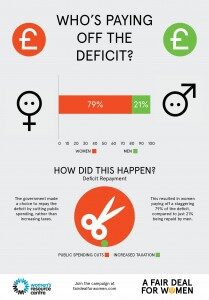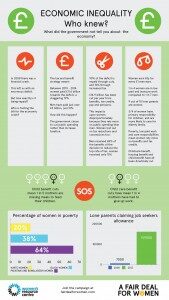
****Vital updates to this page coming soon! In the mean time, view our new report here http://womenspeakout.wrc.org.uk/report/ ‘****
At the moment economic, tax, and spending policies benefit men more than women.
How? When a Government needs to pay off a deficit, there are two options:
- Increase taxes
- Reduce public spending
In recent years public spending has been cut but taxes have not been significantly raised. In fact between 2010 and 2015, 90% of the reduction in the budget deficit came from public spending cuts, and only 10% from increased taxation.

Click here for full sized infographic
Sources
This affects women negatively. How?
Because women are primary carers for children and the elderly, because they are more focused in low paid and insecure work, and because they are more likely to live in poverty, women are more reliant upon public services.
By contrast, men overall earn considerably more money than women and therefore would be taxed more. So the decision not to raise taxes helps them.
This means that, since 2010, men contributed £3.047 billion (21%) to the reduction of the deficit, while women contributed £11.628 billion (79%).

Click to see full sized infographic
Sources
Cuts to public spending are particularly damaging to disabled women. Closure of the Independent Living Fund (ILF), as well as cuts to social care and housing benefit are pushing disabled women into poverty at an alarming rate.
The rolling out of Universal Credit as a replacement to many types of benefits could see half a million disabled people losing out, and the move from the Disability Living Allowance (DLA) to Personal Independence Payment (PIP) means that many disabled women will lose what they need for independent living.
What Women’s Charities do to address these issues
Women’s Charities provide information to evidence and challenge the ways that current economic, tax, and spending policies affect women. They also formulate and publicise alternative economic models that have wider social and economic benefits for all.
What can Parliament do?
- Assess all economic decisions to determine whether they will drastically impact women’s lives
- Change some of the tax systems that benefit men. This can include making sure that tax concessions in the household do not necessarily go straight to the highest earner
- Halt and reverse benefit cuts that women desperately need
- Restore child benefit and then raise it in line with real earnings
- Halt and reverse discriminatory policies which disproportionately impact upon disabled women
Sources
Share on FacebookShare on Twitter
